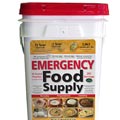Awhile back one of our readers emailed us with the following question:
We are your average Americans that want to start prepping but have a few things slowing us down. We have a mortgage, car payment, and both of us have health issues. We don’t have $200-300 to spend on just empty bugout bags. How about some articles on real frugal prepping for us regular folks?
First, I want to say that prepping can be done very successfully with little to no budget. In fact, I have said many times in the past but it probably needs to be repeated; those who prep with knowledge will be far better off than those who rely solely on their gear to survive. In my opinion, knowledge it the key to surviving just about any situation. That being said, there are some advantages to being able to stockpile food, water, and some basic survival supplies.
Here are some tips on how to prep on a budget:

Take an Inventory of your Current Supplies
The first thing I recommend is to take a full inventory your current supplies. Most of us have more gear and equipment than we actually realize. Having a good inventory of your current supplies will prevent you from buying something that you may already have. It also helps you sort through all the junk you don’t need, allowing you to sell that useless crap on eBay or at a Garage Sale.
What items do you own that could be used in a survival situation? Tools, Pots & Pans, Blankets, etc…

Establish a Written Budget
The next step on your list should be establishing a realistic prepping budget. How much money can you safely spend on prepping? Are there other areas of your budget that can be cut or eliminated?
In my opinion, having a dedicated section in your budget for prepping is no different from buying home insurance or a health insurance policy.

Slow and Steady Wins the Race
A lot of people think they need to do everything at once. If they can’t have it now, they often become discouraged or give up altogether. While most people don’t have the financial means to buy everything at once, that doesn’t mean you should give up on prepping.
Build you supplies when you can. If it means buying one extra can of food every time you go to the grocery store, then start with one can. Even buying that one extra can of food a regular basis will add up quickly.

You don’t need Commercial Survival foods
Some people make the mistake of thinking they need to buy expensive commercial survival food. In my opinion, you would be better served by stocking up on the foods that you already eat. Commercial survival food can cost thousands of dollars for a single person. Now add up all the members of your family and most people would be hard-pressed to find that kind of money just lying around the house.
In my opinion, most commercial survival food is a waste of money and a lot of it is simply inedible. Many first time preppers make the mistake of stockpiling foods that they would never eat in a non-survival situation. In a SHTF Emergency do you really want to start eating foods that may disagree with your body?

Buy When it’s on Sale, and Become an Extreme Couponer.
Well, you don’t have to spend hours upon hours clipping coupons, but you should take advantage of every chance you can get to save money. Most major food manufacturers offer money-saving coupons through their websites, local newspapers, Facebook pages or other online resources.
A few minutes of work every week can save you thousands of dollars throughout the course of a year.

Stock up on Knowledge
If you’re short on funds, compensate by stocking up on knowledge. By learning everything you can about the art of survival, you will ensure that you and your family have a better than average chance of surviving if things go bad.
Most survival situations can be prevented or survived by learning basic survival skills.

Spend Time, Not Money
Having a basic understanding of survival and knowing the techniques are not enough. While knowledge is a key aspect of survival, taking the time to practice your skills is a key part of the survival puzzle. Training is what makes the difference between success and failure (life or death).
To really be able to count on your knowledge when the SHTF, you need to run through your techniques in a number of scenarios and environments. The more you train in real world situations, the more likely it is that you will be able to perform your skills when it really matters.
Have any tips for those prepping on a budget? What recommendations do you have?




On the subject of food, we buy it on sale, and grow our own then my wife & I can and/or dehydrate the majority of it.
Here’s a hint; If it’s canned or dehydrated in the store you can do it at home with a little practice, my wife even figured out how to can meatloaf and other meats, vegetable/dishes and even Mexican meat dishes as well. Here’s the plus = you know what’s in it because you’re the one who did it!
Oh, and by the way, when it comes to weaponry for food and/or protection.
Primitive weapons as well as air rifles are quiet, inexpensive and effective with a little practice.
And as for firearms a .22lr is inexpensive, relatively quiet, very effective and let’s put it bluntly could you carry around a 1,000 rounds of any other ammo for any amount of time without getting a hernia?
Think before you buy, buy with common sense instead of machismo.
Don’t overlook institutional size cans, they can provide disposable cooking pots, and are lighter once emptied than most regular pots and pans. Useful for cooking over open fire. Used this for my beef stew more than once
Barter: My son has a residential fence company. and barters part of his labor: He has accumulated several good rifles as part of his labor bid. And, if you pan on an off grid garden, you need hand tools (shovels hoes, rakes etc. and can get them really cheap at yard sales where someone else simply has no need for em.’
Hello every one. I am new to this site, But not new to prepping. I live in the city with a city lot. I have a garden that I grow in boxes I made out of used pallets. It can be done on a smaller scale in an Apt, or condo. As most plants will grow just fine. A five gallon bucket is great for a potato plant, And flower box that hangs on a rail works great for things like pole beans or cucks.
Bows are great for security and hunting meals. Yes they can be expensive but only if you buy new. I took the time to look around and shop. I found a 1998 Matthews compound now with arrows and case for &150. It’s used yes but is in great shape. I’ve replaced the cams and string only(only cause I’m short and the guy I got it from was like 2 ft taller than me). So all in all I’ve a great multi purpose weapon that is quiet lightweight and holds up for $250 total after new parts.
Don’t forget hygiene items!! Also, laundry and dish soaps and clothespins. Empty juice jugs can be rinsed out and used for water storage and they are not too heavy, as some water storage containers are. Charcoal and matches, candles and batteries for flashlights, seasonable clothing, practical shoes, etc.
I am new to all this. I have read a lot about prepping and have wanted to do it for a long time but have been frozen with indecision. I live in a trailer. park in a 16 ft (19 if including hitch) trailer in Bakersfield California. Does anyone have any ideas what to do about food and water storage in such a small space? Also what other preposition should I start on. I own the trailer so I have shelter covered.
i just read a thing about a police department in eureka missouri that put in an area on their parking lot for people to use while buying from someone on craigs list. for those who fear craigs list talk to local police and ask for something like this in their area.
I’m new to prepping. I see a lot of people talking about bagged rice and beans. Would breaking down a big bag and sealing it make it last longer?
Get healthy. Good nutrition, exercise. Get off medications if you can.
Learn important skills: cooking, sewing, preserving foods, gardening, sterilizing water, first aid, etc. These skills can also be used for bartering.
If you can, get a house out in the country and pay for it outright, no mortgage.
Keep quiet and do not let people know you are a prepper.